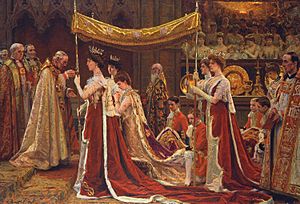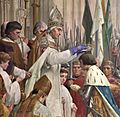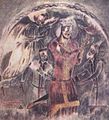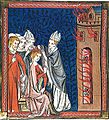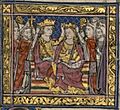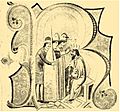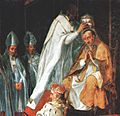Coronation facts for kids
A coronation is a very special ceremony where a new king or queen officially takes their place as ruler. During this event, a crown is usually placed on their head. They also receive other important items that show their power, like a scepter or an orb. Sometimes, the king or queen's partner, called a consort, also has a similar ceremony.
If a ceremony doesn't involve placing a crown on someone's head, it's often called an enthronement. During a coronation, the new ruler might make special promises to their country. People might also show their respect and loyalty to the new monarch.
In the past, coronations were a huge deal for most monarchies around the world. But over time, many countries have changed their traditions. Today, most modern monarchies have simpler ceremonies, or sometimes no ceremony at all. However, coronations are still held in countries like the United Kingdom, Tonga, and some nations in Asia and Africa.
Sometimes, when people say "coronation" today, they might just mean any official ceremony where a new ruler takes power, even if no actual crown is used.
In many Western-style coronations, especially in places like Great Britain and Tonga, the ruler is also anointed with special holy oil. This part of the ceremony has a strong religious meaning, similar to examples found in the Bible. Other countries might use different rituals, like bathing or drinking a sacred drink. These actions often symbolize that the ruler has special favor or blessings from a divine power.
Contents
History of Coronations
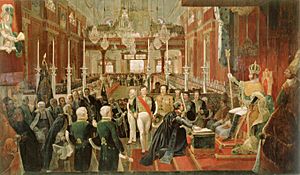
For a long time, the idea of kings and queens, coronations, and gods were closely connected. In ancient times, some rulers were even thought to be gods or partly divine. For example, the Egyptian Pharaoh was believed to be the son of the sun god, Ra. In Japan, the Emperor was thought to be a descendant of the sun goddess, Amaterasu.
In Rome, people even worshipped their emperors. Later, in Medieval Europe, kings and queens claimed to have a "divine right" to rule. This meant they believed God had chosen them to be in charge.
Coronations were a way to show these strong connections between rulers and divine power. However, in recent centuries, these beliefs have become less common. Because of this, coronations have often been changed or even stopped. They now often reflect the idea that a country has a constitution and laws, not just a ruler chosen by a god. Still, some monarchies keep a religious part in their ceremonies. Others have chosen simpler enthronement ceremonies, or sometimes no ceremony at all when a new ruler takes the throne.
What Happens at a Coronation?
A coronation is a very old and traditional event. It usually involves several important steps:
- Procession: The new monarch often arrives in a grand procession, sometimes in a special carriage, to the place where the ceremony will happen.
- Taking an Oath: The king or queen usually takes an oath, which is a serious promise, to rule fairly and uphold the laws of the country.
- Anointing: In some coronations, especially in the United Kingdom, the monarch is anointed with holy oil. This is a very sacred part of the ceremony, symbolizing a blessing from God.
- Investiture: This is when the monarch receives the special items of regalia. These include the crown, which is placed on their head, and other symbols of power like the scepter (a staff) and the orb (a golden ball with a cross).
- Homage: Important people in the country, like nobles or religious leaders, might come forward to show their loyalty and respect to the new ruler.
- Enthronement: Finally, the monarch sits on the throne, officially taking their place as the ruler.
These steps can vary a lot from one country to another, depending on their unique history and traditions.
Related pages
Images for kids
-
The coronation of Charles VII of France (1429), detail of the painting Jeanne d'Arc (1886–1890) by Jules Eugène Lenepveu
-
Miniature of Charlemagne crowned emperor by Pope Leo III, from Chroniques de France ou de Saint Denis, vol. 1; France, second quarter of 14th century.
-
Roger II of Sicily receiving his crown directly from Jesus Christ, mosaic from Martorana, Palermo
-
The coronation of King Demetrius I of Georgia by the angels, 12th century.
-
The Coronation of Queen Victoria, surrounded by Peers of the Realm in Westminster Abbey on 28 June 1838, by Edmund Thomas Parris
-
Coronation of Philip, son of King Louis VII of France, as junior king
-
Coronation of Pepin the Short
-
Richard I of England crowned king.
-
Coronation of Maria of Montferrat and John of Brienne, King of Jerusalem and Latin Emperor of Constantinople
-
The coronation of Béla IV King of Hungary
-
Coronation of Pope Celestine V.
-
Frederick I of Prussia, being anointed by two Protestant bishops after his coronation at Königsberg in 1701.
-
Anointing of Tsar Nicholas II of Russia during his coronation in 1896.
-
Coronation Scene by Dutch painter Abraham Bloemaert
See also
 In Spanish: Consagración real para niños
In Spanish: Consagración real para niños


